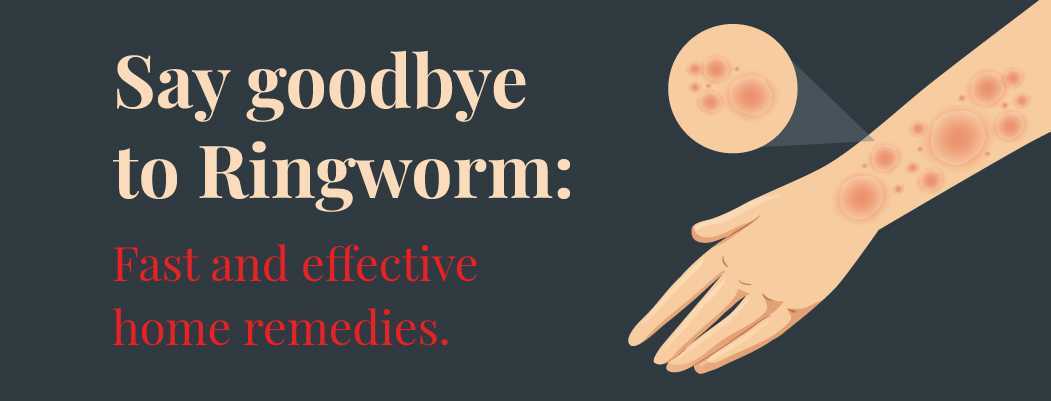How to cure ringworm fast
February 24, 2023

Ringworm is a common fungal infection affecting the skin, scalp, and nails. It is not caused by a worm, as the name suggests, but rather by a type of fungus known as dermatophytes. This condition is highly contagious and can spread quickly from one person to another, especially in crowded or poorly ventilated areas. It can be an unsightly and uncomfortable condition, and those who suffer from it are often eager to find a fast cure.
Contents
Symptoms of Ringworm
The symptoms of ringworm vary depending on the location of the infection. The most common symptoms of ringworm include the following:
- A red, scaly, and itchy rash that forms in a circular shape
- A rash that is surrounded by a raised, red border
- Blisters or pus-filled sores on the skin
- Scaling or flaking of the skin
- Hair loss on the scalp
- Thick, discoloured, or brittle nails
Causes of Ringworm
Ringworm is caused by a type of fungus known as dermatophytes. Dermatophytes thrive in warm, moist environments and can infect the skin, scalp, and nails when they come into contact with human skin. Some common causes of ringworm include:
- Contact with infected animals: Ringworm is commonly spread from animals to humans, especially cats.
- Sharing personal items: Sharing towels, brushes, combs, and other personal items with someone who has ringworm can also spread the infection.
- Poor hygiene: Poor hygiene practices, such as not washing your hands regularly, can increase your risk of developing ringworm.
- Warm, moist environments: Dermatophytes thrive in warm, moist environments, such as locker rooms, swimming pools, and communal showers, increasing your risk of developing ringworm.
Risk Factors for Ringworm
Certain factors can increase your risk of developing ringworm, including:
- Age: Children are at a higher risk of developing ringworm because their immune systems are still developing.
- Poor hygiene: Poor hygiene practices, such as not washing your hands regularly, can increase your risk of developing ringworm.
- Exposure to infected animals: Those who spend much time around animals, such as farmers and pet owners, are at a higher risk of developing ringworm.
- Weak immune system: Individuals with a weakened immune system, such as those with HIV/AIDS, are at a higher risk of developing ringworm.
- Skin injuries: Skin injuries, such as cuts and scrapes, can make it easier for the fungus to infect the skin.
Home Remedies for Ringworm
Here are some of the most effective home remedies for ringworm:
- Tea tree oil: Tea tree oil has antifungal properties and can be applied topically to the affected area to help clear up ringworm.
- Garlic: Garlic has antifungal properties and can be applied topically to the affected area to help treat ringworm.
- Apple cider vinegar: Apple cider vinegar has antifungal properties and can be used to treat ringworm. Simply apply the vinegar to the affected area with a cotton ball and allow it to dry. Repeat this process twice to thrice daily until the infection clears.
- Coconut oil has antifungal and anti-inflammatory properties, making it an effective treatment for ringworm. Apply the oil directly to the affected area two to three times a day.
- Turmeric: Turmeric has antifungal properties and can be used to treat ringworm. Mix turmeric powder with water to form a paste and apply it to the affected area. Leave the paste on for 30 minutes before washing it off with warm water.
- Oregano oil: Oregano oil has antifungal properties and can be used to treat ringworm. Apply a few drops of the oil to the affected area two to three times a day.
- Neem oil: Neem oil has antifungal properties and can be used to treat ringworm. Apply a few drops of the oil to the affected area two to three times a day.
- Lemon juice: Lemon juice has antifungal properties and can be used to treat ringworm. Simply apply the juice to the affected area with a cotton ball and allow it to dry. Repeat this process two to three times a day until the infection has cleared.
It is important to remember that these remedies may not work for everyone and that some people may have skin reactions to certain ingredients. You should consult a doctor for proper treatment if your symptoms persist or worsen.
In addition to these home remedies, there are also certain steps that you can take to prevent the spread of ringworm and promote healing:
- Keep the affected area clean and dry: Wash the area with soap and water and dry it thoroughly.
- Avoid sharing personal items: Do not share towels, brushes, combs, and other personal items with others to prevent the spread of the infection.
- Wear loose clothing: Wear loose clothing that allows air to circulate around the affected area to promote healing.
- Avoid scratching: Scratching the affected area can worsen the infection and spread it to other parts of the body.
Prevention of ringworm
To prevent the spread of ringworm and reduce your risk of infection, practice good hygiene by washing your hands regularly, avoiding sharing personal items, and keeping your skin clean and dry. Wear loose clothing and avoid scratching the affected area to prevent the infection from spreading. It is also important to keep your environment clean and dry, especially in areas where you sweat, such as the feet, groin, and underarms. If you have a pet that has ringworm, take steps to prevent it from spreading to other pets and people.
In conclusion, ringworm is a common fungal infection that can be treated with home remedies, such as apple cider vinegar, coconut oil, turmeric, and oregano oil. However, if your symptoms persist or worsen, you should consult a doctor for proper treatment. Remember to practice good hygiene and take steps to prevent the spread of the infection to others.
When to see a doctor?
It is important to see a dermatologist if your symptoms persist or worsen after trying home remedies or if you have a weakened immune system, diabetes, or another underlying health condition that puts you at risk for complications. Your doctor can diagnose the infection and determine the best course of treatment, which may include prescription antifungal medication.
People also ask
What is the fastest home remedy for ringworm?
There are several home remedies for ringworm, but the fastest one depends on the severity of the infection. Tea tree oil, apple cider vinegar, and garlic are some of the popular home remedies that can help treat ringworm. However, it’s important to note that severe cases of ringworm may require medical treatment.
What is the best cure for ringworm?
The best cure for ringworm depends on the severity of the infection. However, severe or persistent cases may require you to consult with an expert.
Can ringworm go away naturally?
Ringworm can go away naturally, but it may take several weeks or even months to resolve on its own. In some cases, the infection may even spread or worsen if left untreated. It’s recommended to seek medical treatment if you suspect you have ringworm, especially if it is not improving or spreading.








